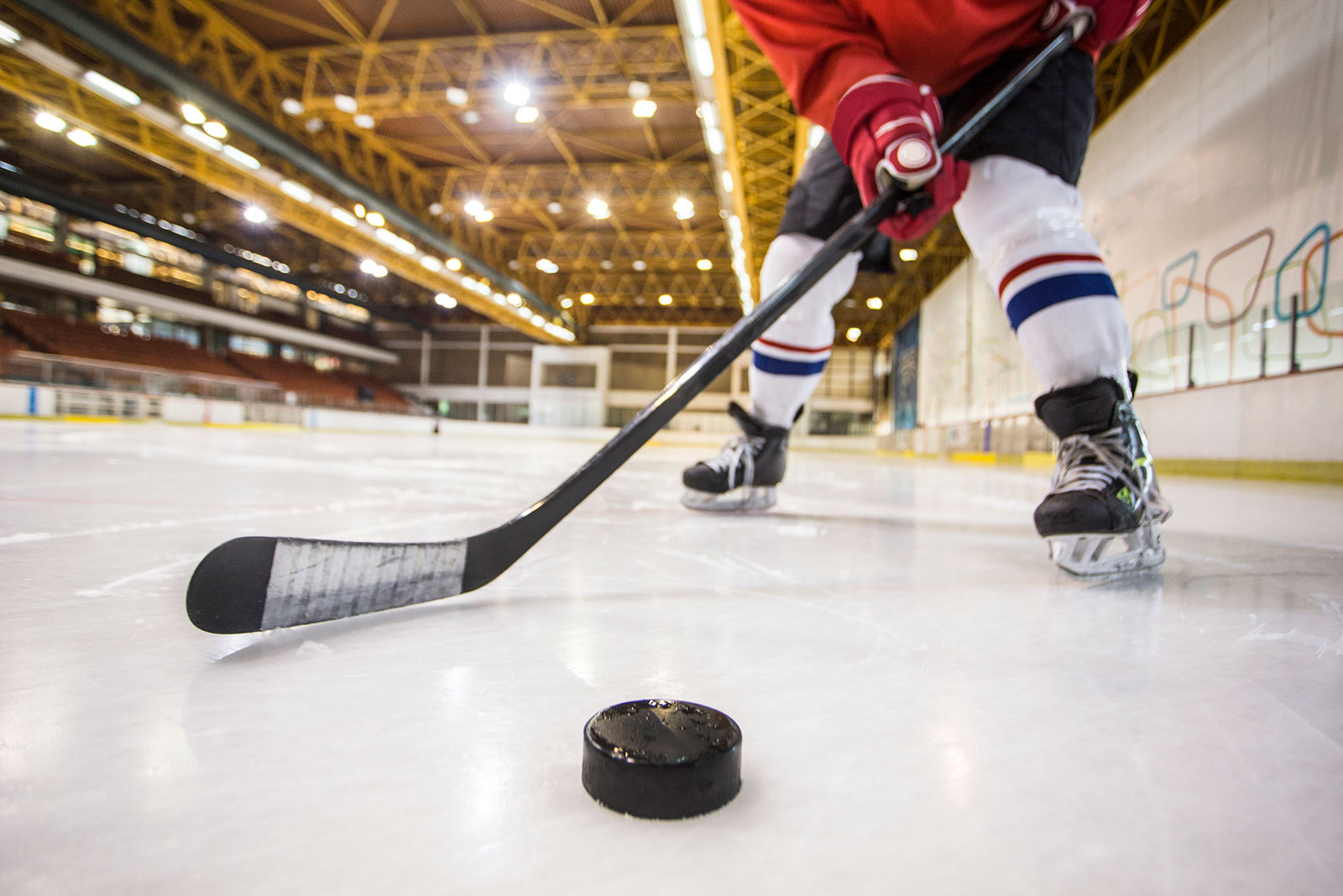What are the Physical Benefits of Playing Ice Hockey? Playing ice hockey improves cardiovascular health and strengthens muscles. It also enhances coordination, agility, and endurance.
Ice hockey offers numerous physical benefits that contribute to overall health. The sport requires constant movement, which boosts cardiovascular health and burns calories. Players develop strong leg muscles from skating and improve upper body strength through stick handling and shooting.
Ice hockey also enhances coordination and balance due to the need for precise movements on the ice. Quick direction changes and high-speed play improve agility and reflexes. Regular participation in ice hockey can lead to better endurance and stamina. These physical benefits make ice hockey an excellent choice for those looking to improve their fitness while enjoying a fast-paced and exciting sport.
Credit: www.healthfitnessrevolution.com
Introduction To Ice Hockey’s Health Perks
Playing ice hockey offers many physical benefits. The sport is not just fun; it’s also great for your body. Ice hockey helps you stay fit and healthy.
Brief History Of Ice Hockey
Ice hockey started in Canada in the 19th century. It quickly became popular across the world. The game’s fast pace and physical demands make it unique.
Popularity And Physicality Of The Sport
Ice hockey is popular in many countries. The sport requires strength, speed, and stamina. Players skate, pass, and shoot the puck. These actions improve their fitness.
Physical Benefits Of Playing Ice Hockey
- Cardiovascular Health: Ice hockey boosts heart health. It involves constant movement, which increases your heart rate.
- Muscle Strength: Skating and shooting build leg and upper body muscles.
- Endurance: The game’s pace improves your stamina over time.
- Coordination: Handling the puck and skating enhances hand-eye coordination.
- Flexibility: Quick turns and stops increase body flexibility.
Cardiovascular Fitness Through Skating
Ice hockey isn’t just a thrilling sport; it offers numerous physical benefits. One significant advantage is cardiovascular fitness through skating. This intense exercise keeps your heart and lungs in top shape. Let’s dive into the details!
Endurance Building
Skating on ice demands consistent effort, which builds endurance. Players skate rapidly across the rink, pushing their limits. This constant motion strengthens muscles and improves stamina.
Endurance helps players last longer during games. It also improves their performance over time. With each practice, their bodies adapt, making them stronger. This adaptation leads to better overall fitness.
Heart Rate And Blood Flow
Ice hockey increases your heart rate significantly. This sport requires bursts of speed and quick stops. These actions elevate your heart rate, promoting better blood flow throughout the body.
Improved blood flow means more oxygen reaches your muscles. This boosts energy levels and enhances performance. Regular skating keeps your heart strong and healthy.
Here’s a summary of the benefits in table form:
| Benefit | Impact |
|---|---|
| Endurance Building | Increases stamina and muscle strength |
| Heart Rate and Blood Flow | Improves oxygen delivery and energy levels |
Overall, ice hockey is fantastic for your cardiovascular health. The combination of endurance building and increased heart rate ensures a strong, healthy body.
Strength Development On Ice
Playing ice hockey builds amazing strength. Skating, shooting, and checking require intense physical effort. This sport helps players develop a strong body and mind. Let’s explore the benefits of strength development in detail.
Core Stability Enhancement
Ice hockey improves core stability. Skating demands balance and control. Players must stay upright on the ice. This activates their core muscles. The core includes the abs, lower back, and hips. A strong core helps players move quickly and powerfully.
- Improved Balance: Skating on ice improves balance and stability.
- Enhanced Posture: A strong core supports good posture.
- Reduced Injuries: Better core stability helps prevent injuries.
Lower Body Power
Ice hockey boosts lower body power. Skating works the legs intensely. Players push off with force to move fast. This builds strong muscles in the legs and glutes. Strong legs help players accelerate and change direction quickly.
| Muscle Group | Exercise | Benefit |
|---|---|---|
| Quads | Skating Sprints | Improves speed |
| Hamstrings | Backward Skating | Enhances agility |
| Glutes | Power Strides | Increases power |
- Speed: Strong legs help players skate faster.
- Agility: Powerful legs improve quick direction changes.
- Endurance: Enhanced lower body strength boosts stamina.
Agility And Flexibility Gains
Playing ice hockey offers numerous physical benefits. Among these are agility and flexibility gains. These gains help players move swiftly and avoid injuries.
Quick Movements And Reflexes
Ice hockey requires rapid direction changes. Players must skate fast, stop quickly, and change direction. These actions improve quick movements and reflexes. The game also involves dodging opponents and puck handling. This enhances hand-eye coordination and overall agility.
Regular practice on the ice builds muscle memory. Players react faster and more accurately over time.
Muscle Elasticity And Injury Prevention
Flexibility in muscles is crucial for ice hockey players. Stretching before and after games is vital. This routine improves muscle elasticity and reduces injury risks. Flexible muscles can handle sudden movements better.
Here is a table summarizing the benefits:
| Benefit | Description |
|---|---|
| Quick Movements | Improved speed and direction changes |
| Reflexes | Faster reaction times |
| Muscle Elasticity | Reduced risk of injuries |
Regular stretching and warm-ups are essential. They prepare muscles for intense activity. This preparation helps in injury prevention.
Overall, playing ice hockey enhances agility and flexibility. These benefits improve performance and safety on the ice.
Weight Management And Fat Loss
Playing ice hockey helps with weight management and fat loss. The sport is intense and fast-paced. This makes it a great way to burn calories and increase metabolism.
Caloric Burn During Games
Ice hockey games are high-intensity. Players can burn a lot of calories.
Here’s a table showing the average calories burned:
| Player Weight (lbs) | Calories Burned per Hour |
|---|---|
| 120 | 500 |
| 150 | 600 |
| 180 | 700 |
Metabolic Rate Increase
Playing ice hockey boosts your metabolic rate. This means your body burns more calories even when resting.
Increased metabolism helps with fat loss and weight management.
Here’s how it works:
- High-intensity workouts raise your metabolic rate.
- More muscle mass increases calorie burn.
- Consistent activity leads to long-term fat loss.
Mental Health Advantages
Playing ice hockey offers numerous mental health advantages. This sport challenges both body and mind. It provides a unique way to relieve stress and improve cognitive functions. Ice hockey is more than just a physical activity. It is also a mental workout.
Stress Relief And Mental Clarity
Ice hockey helps in stress relief. The fast-paced nature of the game keeps your mind focused. You forget everyday worries while playing. The physical exertion releases endorphins, the body’s natural stress relievers. These endorphins create a sense of mental clarity and well-being.
Regular participation in ice hockey can lead to a reduction in anxiety levels. The social aspect of the game also plays a key role. Playing with teammates fosters a sense of community and support. This helps alleviate feelings of loneliness and isolation.
Cognitive Function Improvement
Ice hockey demands quick thinking and fast decision-making. Players must constantly analyze the game. This improves their cognitive functions. The need to strategize and anticipate opponents’ moves enhances mental agility.
Studies show that sports like ice hockey can boost brain function. The sport requires coordination, balance, and quick reflexes. These physical demands stimulate brain activity. This leads to better memory and faster information processing. Thus, playing ice hockey can sharpen your mind and enhance cognitive skills.
Social Benefits And Teamwork
Playing ice hockey offers numerous physical benefits. It also helps players develop socially. Being part of a team fosters camaraderie and friendship. Team sports like hockey teach life skills that are invaluable.
Communication Skills
Ice hockey requires constant communication among team members. Players must talk to each other during the game. They give and receive instructions. This helps improve their communication skills. Effective communication is vital for winning games. It also helps in daily life and future careers.
- Players learn to listen actively.
- They express their ideas clearly.
- They learn to give and accept feedback.
Sense Of Community
Being part of a hockey team gives a strong sense of community. Players support each other both on and off the ice. This builds lasting friendships and a sense of belonging. Team activities and events further strengthen these bonds.
| Benefits | Description |
|---|---|
| Friendship | Builds strong, lasting relationships |
| Belonging | Creates a sense of being part of something bigger |
| Support | Offers emotional and social support |
Playing ice hockey is not just about the physical game. It helps in shaping well-rounded individuals. It develops important life skills through teamwork and social interactions.
Bone Density And Joint Health
Playing ice hockey offers many physical benefits. One crucial aspect is bone density and joint health. The sport involves intense physical activity, which strengthens bones and improves joint function.
Impact On Skeletal Strength
Ice hockey requires players to skate, shoot, and hit. These activities put pressure on bones. This pressure helps to increase bone density. Strong bones reduce the risk of fractures.
Weight-bearing exercises in ice hockey stimulate bone growth. This keeps the skeletal system robust. Both young and older players benefit from stronger bones.
Joint Mobility And Lubrication
Ice hockey improves joint mobility. Players must move quickly and change directions. This constant movement keeps joints flexible.
Synovial fluid lubricates joints. Skating and moving in ice hockey enhance fluid production. Well-lubricated joints move smoothly and reduce pain.
Enhanced Respiratory Efficiency
Playing ice hockey not only offers thrilling excitement, but it also significantly boosts respiratory efficiency. As players dash and glide across the ice, their lungs work harder to keep up. This leads to several physical benefits, especially for the respiratory system.
Lung Capacity And Oxygen Uptake
Engaging in ice hockey regularly can increase lung capacity. Players need to breathe deeply and frequently during the game. This continuous need for oxygen helps in expanding the lungs. Over time, this can lead to better oxygen uptake. Enhanced oxygen uptake means your body can utilize oxygen more efficiently. This is crucial for maintaining stamina and endurance during the game.
Breathing Techniques
Ice hockey players often develop better breathing techniques. Correct breathing techniques are essential for maintaining energy levels. Players learn to control their breath to maximize oxygen intake. This helps in sustaining their performance throughout the game. Proper breathing techniques also reduce the risk of fatigue. This allows players to stay active and alert on the ice.
Credit: www.ffxnow.com
Ice Hockey Nutrition And Recovery
Playing ice hockey demands a lot from the body. Proper nutrition and recovery are crucial for optimal performance. This section delves into essential dietary needs and recovery strategies for hockey players.
Diet For Hockey Players
A balanced diet is key for hockey players. They need energy, strength, and endurance. Here’s a typical meal plan:
| Meal | Foods |
|---|---|
| Breakfast | Oatmeal, fruits, and eggs |
| Lunch | Grilled chicken, quinoa, and veggies |
| Dinner | Salmon, brown rice, and broccoli |
| Snacks | Greek yogurt, nuts, and protein bars |
Water intake is vital. Drink plenty of water throughout the day. Hydration impacts muscle function and energy levels. Include electrolytes to replace lost minerals. Avoid sugary drinks and junk food.
Importance Of Rest And Rehabilitation
Rest is as important as training. It helps muscles recover and grow. Aim for 8 hours of sleep per night. Good sleep improves reaction times and focus.
Rehabilitation is crucial after games and practices. Use ice packs on sore muscles. Stretching exercises prevent injuries. Consider massages for muscle relaxation. Foam rolling helps break down muscle knots.
Taking breaks between intense workouts is essential. This prevents overtraining and reduces injury risks. Listen to your body. Rest when needed. Balance training with adequate recovery time.
Safety Measures And Equipment
Playing ice hockey is thrilling. It offers numerous physical benefits. Staying safe is crucial. Proper safety measures and equipment are essential. This ensures a fun and injury-free experience.
Protective Gear Essentials
Wearing the right gear is vital. Below is a table of essential protective equipment:
| Equipment | Purpose |
|---|---|
| Helmet | Protects the head from injuries. |
| Shoulder Pads | Guards the shoulders and chest. |
| Elbow Pads | Shields the elbows from impacts. |
| Gloves | Protects hands and fingers. |
| Mouth Guard | Prevents dental injuries. |
| Shin Guards | Protects the knees and lower legs. |
| Skates | Provides mobility and foot protection. |
Injury Risk And Prevention
While ice hockey is fun, injuries can happen. Here are some tips to reduce injury risks:
- Warm up before playing.
- Stretch your muscles properly.
- Stay hydrated during the game.
- Use well-fitted gear for better protection.
- Learn proper skating techniques.
- Follow the game rules strictly.
By following these tips, you can enjoy the game safely. Remember, safety first!
Credit: www.okanaganhockey.com
Conclusion: Integrating Hockey Into A Healthy Lifestyle
Ice hockey is more than just a thrilling sport. It offers numerous physical benefits. By integrating hockey into your lifestyle, you can enhance your overall well-being. This section explains how playing ice hockey contributes to a balanced and healthy lifestyle.
Balancing Sport And Wellness
Playing ice hockey helps in building cardiovascular endurance. Skating at high speeds and quick changes in direction strengthen the heart. This sport also improves muscle strength and flexibility. The sport requires strong legs, core, and upper body muscles.
| Physical Aspect | Benefit |
|---|---|
| Cardiovascular Health | Improved heart and lung function |
| Muscle Strength | Stronger legs, core, and upper body |
| Flexibility | Enhanced range of motion |
| Coordination | Better hand-eye coordination |
Balancing the physical demands of ice hockey with proper nutrition and rest is crucial. A balanced diet fuels your body for intense play. Adequate rest helps in recovery and muscle building. Combining these elements creates a holistic approach to wellness.
Long-term Benefits Of Regular Play
Regular play offers long-term health benefits. It reduces the risk of chronic diseases. Playing ice hockey frequently can help maintain healthy body weight. The sport also boosts mental health. Engaging in this sport releases endorphins, which reduce stress and anxiety.
- Reduced risk of heart disease
- Lower chance of diabetes
- Improved mental health
- Better social connections
Playing ice hockey regularly fosters a sense of community and teamwork. It encourages social interactions and builds lasting friendships. The sport instills discipline and time management skills. These skills are beneficial both on and off the rink.
Incorporating ice hockey into your routine ensures a balanced lifestyle. It provides physical, mental, and social benefits. Start playing ice hockey today for a healthier tomorrow.
Frequently Asked Questions
What Physical Benefits Can A Person Gain From Playing For Hockey?
Playing hockey improves cardiovascular health, builds muscle strength, enhances coordination, boosts endurance, and promotes agility. It also helps with weight management and increases flexibility.
What Does Ice Hockey Do To Your Body?
Ice hockey boosts cardiovascular health, strengthens muscles, and improves coordination. It also enhances endurance, agility, and mental focus.
How Does Playing Hockey Help Us Grow Physically?
Playing hockey boosts physical growth by enhancing cardiovascular health, building muscle strength, and improving coordination. Regular play increases endurance and agility.
Is Hockey A Healthy Sport?
Yes, hockey is a healthy sport. It improves cardiovascular fitness, strength, and coordination. Playing hockey also enhances teamwork and mental agility.
Conclusion
Playing ice hockey offers numerous physical benefits. It improves cardiovascular health, builds muscle strength, and enhances coordination. Regular participation helps maintain a healthy weight and boosts overall fitness. Embrace the sport to enjoy these benefits and improve your physical well-being.
Ice hockey is a fun way to stay active and healthy.







